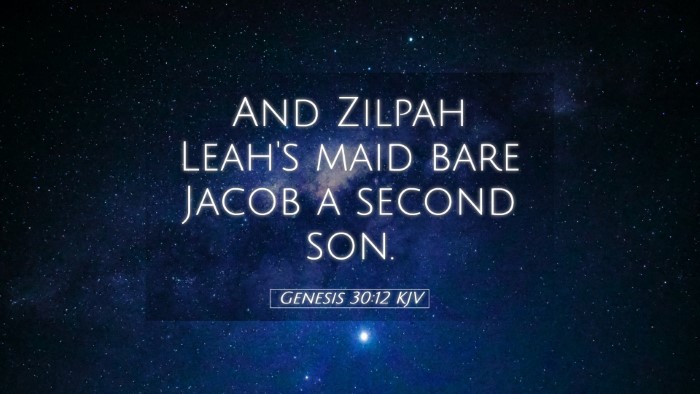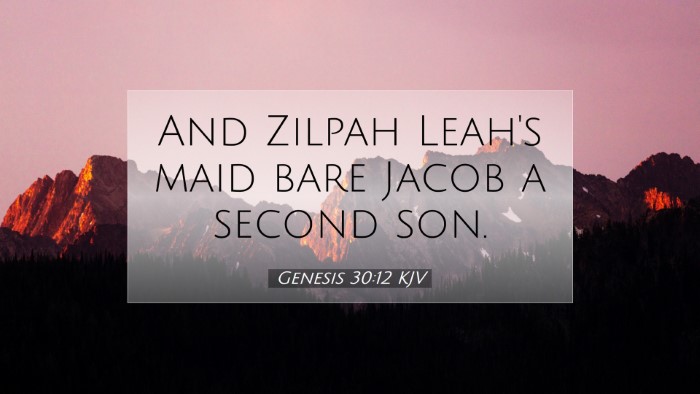Commentary on Genesis 30:12
Genesis 30:12 (KJV): "And Leah's maid Zilpah bore Jacob a second son."
Introduction
The narrative surrounding Genesis 30:12 reveals profound insights into the lives of Jacob, Leah, and the dynamics of family within the patriarchal context of Israel. This verse is situated within a complex tapestry of relationships marked by competition, strife, and divine providence. The births of children among Jacob's wives and their maidservants provide a unique reflection on themes such as fertility, identity, and the unfolding of God’s covenantal promises.
Contextual Overview
In the lineage of the patriarchs, Leah and Rachel are central figures whose rivalries underscore the emotional and spiritual dimensions of their relationships with Jacob. Zilpah, Leah's maid, is introduced in this verse as a pivotal character in the continuation of Jacob’s family line. The cultural implications of the era and the practice of polygamy significantly inform the understanding of this text.
Insights from Matthew Henry
Matthew Henry, in his comprehensive commentary, emphasizes the providential hand of God in the seemingly mundane events of life. He notes that the birth of Zilpah's child is part of God’s plan to fulfill His promise to Jacob regarding the multiplication of his seed. Henry suggests that the use of maidservants as surrogates illustrates the human tendency to strive for fulfillment outside of divine timing. This commentary drives home the point that God's purposes are often fulfilled despite human failures and imperfections.
Insights from Albert Barnes
Albert Barnes focuses on the implications of Zilpah's second son in the context of Leah’s rivalry with Rachel. He points out that Leah’s desire for love and recognition drives her to employ her maidservant in the process of competition. By providing an additional child through Zilpah, Leah attempts to solidify her status in Jacob's eyes. Barnes raises the wider theological principle that while human actions can reflect selfish motives, God can sovereignly work through these actions to advance His purposes.
Insights from Adam Clarke
Adam Clarke provides a detailed exegesis of the cultural practices surrounding childbirth in Israelite society. He notes that maidservants were often treated as extensions of their mistresses, signifying the depth of familial ties and societal roles. In his analysis, Clarke takes note of the name of the child born from Zilpah—a cultural identifier reflecting God's ongoing covenant with Jacob. Clarke further proposes that the significance of each child's name not only denotes personal identity but also reflects the spiritual narrative of Israel’s history.
Theological Implications
The birth of Zilpah's second son serves as a prominent reminder of God's faithfulness in the midst of human turmoil. Theologically, this verse prompts reflection on:
- Covenant Fulfillment: God's promise to Abraham and his descendants unfolds through complex family dynamics.
- Human Agency and Divine Sovereignty: The interplay of human decisions and God's overarching plan raises questions regarding the nature of free will versus predestination.
- Identity in Christ: The naming practices of children illustrate the importance of identity; for believers, this points to the new identity found in Christ amidst earthly struggles.
Reflections for Pastors and Theologians
For pastors, this text serves as a reminder of the complexities of family and relationships within the church. The struggle for recognition and the use of worldly means to achieve divine ends are issues still highly relevant today. The implications extend into pastoral care, grief, and the need for congregations to find their identity in Christ rather than in social or familial status.
Theologically, scholars are challenged to address the ramifications of Israel’s family dynamics for understanding the nature of grace. In a world that often values success based on human accomplishments, Genesis 30:12 calls for a reevaluation of what it means to be blessed by God.
Conclusion
Genesis 30:12 invites deep reflection on human relationships, divine providence, and the unfolding narrative of redemption. The birth of Zilpah's second son, while a seemingly straightforward occurrence, opens a door to a wealth of theological and pastoral reflections, illustrating how God weaves complex human narratives into His ultimate design for creation and humanity.


